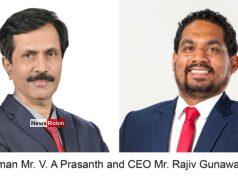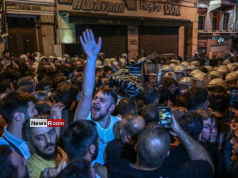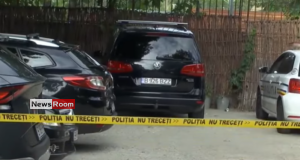Tuesday 27th December, 2022
The 18th anniversary of the Boxing Day tsunami was marked yesterday with a series of commemorative ceremonies. More than 35,000 lives were lost in this country because most Sri Lankans had not even heard the word, tsunami, despite being members of an island nation, and ignored the early warning signs of the impending disaster. Some people even ran seaward when the sea receded moments before the killer wave barrelled across the ocean, while animals were running away.
A cursory look at the post-tsunami period and political, economic and social developments therein will help understand why we are in the current predicament. Immediately after the worst-ever natural disaster in the country, all political leaders sank their differences and appeared on the same platform, holding hands and making a solemn pledge to work, as one, towards rebuilding the country. But their much-publicised unity was short-lived, and they were back at each other’s jugular soon afterwards.
Worryingly, some of the tsunami warning systems installed with foreign assistance are reportedly out of order. So much for our tsunami preparedness! Sri Lanka has paid very high prices for ignoring early warnings since December 2004. In 2019, the then government, the police, etc., received warnings of impending terror attacks on churches and hotels, but nobody cared to act thereon, and about 275 lives were lost in a series of terrorist bombings, as a result, and the economy also suffered a crippling blow. After the 2019 regime change, the Central Bank of Sri Lanka warned the Gotabaya Rajapaksa government that there was the possibility of an economic meltdown due to a foreign currency crisis, and called for preventive action. Its warnings went unheeded, and today the country is insolvent and the people are undergoing untold suffering, and failures are masquerading as saviours.
There have been five Presidents since the 2004 tsunami—Chandrika Bandaranaike Kumaratunga, Mahinda Rajapaksa, Maithripala Sirisena, Gotabaya Rajapaksa and Ranil Wickremesinghe. The country is in a far worse predicament than it was in the immediate aftermath of the tsunami, which did not lead to the bankruptcy of the economy.
Sri Lanka has the dubious honour of being the country with the fourth highest number of public holidays in the world, according to media reports. How can a country improve its national productivity and achieve economic progress while promoting the culture of niksen (‘doing nothing’ in Dutch)? The Sri Lankan governments also try to be popular by declaring additional holidays! However, politicians alone should not be blamed for what has befallen us. The absence of a work ethic is also one of the reasons why the country has remained a ‘developing nation’ since Independence. There is no substitute for hard work if it is progress that a country seeks, as can be seen from the success stories of nations such as South Korea, Japan, and Singapore.
The construction of the German-funded Galle maternity hospital has dragged on for 18 years, we are told. The project commenced after the tsunami disaster, and the health authorities are trotting out lame excuses for the inordinate delay in its completion. Had successive governments cared to expedite its construction, the new hospital would have catered to millions of people by now.
It is only natural that foreigners who feel for this country and are desirous of helping it come out of the current crisis tend to lose patience with us and speak their minds in public. South Korea Disaster Relief Foundation (SKDRF) President Cho Sung Lea reportedly treated some self-important politicians and bureaucrats to a lecture on the virtues of punctuality, integrity and hard work, at a recent meeting in Colombo. Kudos to him! Why visiting German dignitaries have not done likewise as regards the Galle hospital project is the question.
While on the subject of the 2004 tsunami, something pithy written on the back of a trishaw comes to mind. It is an attempt by a three-wheeler driver to keep the public reminded of a lesson that tsunami provided: ‘Sinhale, demale, marakkale, tsunami wele ekama wale’. Roughly rendered into English, it means ‘when the tsunami came, the Sinhalese, Tamils and Muslims were buried together in the same grave’. It evokes heart-wrenching memories of hundreds of unidentified tsunami victims being buried in mass graves dug with excavators, and is, in our book, the best slogan about the futility of stereotyping and othering and the need for sinking differences to achieve national reconciliation.








